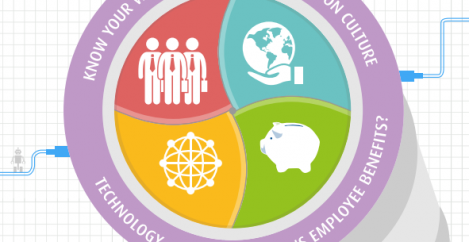August 24, 2015
Flexible working now an almost universal employee benefit, claims study 0
 A new report from employee benefits provider Unum claims to set out the future trends and challenges affecting the benefits packages firms should offer staff. One of the headline claims from the report is that four out of five employers (79 percent) already offer flexible working. ‘The Future of Employee Benefits’ report surveyed 13 organisations and incorporated the results with those of a series of interviews and roundtable discussions with employers and specialists including representatives from the Chartered Institute of Personnel and Development. The report identifies a series of macro trends affecting workplace wellbeing and the recruitment and retention of employees over the next 15 years, which were categorised into four distinct working environments: The Ageless Workplace; The Mindful Workplace; The Intuitive Workplace; and The Collaborative Workplace.
A new report from employee benefits provider Unum claims to set out the future trends and challenges affecting the benefits packages firms should offer staff. One of the headline claims from the report is that four out of five employers (79 percent) already offer flexible working. ‘The Future of Employee Benefits’ report surveyed 13 organisations and incorporated the results with those of a series of interviews and roundtable discussions with employers and specialists including representatives from the Chartered Institute of Personnel and Development. The report identifies a series of macro trends affecting workplace wellbeing and the recruitment and retention of employees over the next 15 years, which were categorised into four distinct working environments: The Ageless Workplace; The Mindful Workplace; The Intuitive Workplace; and The Collaborative Workplace.
Know Your employees: The multi-generational workforce: An increasingly diverse workforce, in terms of age, culture, gender and ability, means that employers need to be treating – and rewarding – each group appropriately, but equally.
Technology:. New technology can help employers to communicate better and stay in touch with staff working remotely or globally. Use benefits technology to audit the take-up of benefits, and ensure it can be reached by mobile devices, perhaps examining the possibility of apps to make access easier.
Always on Culture: Technology and global communications have created an emphasis on hyper-connectivity which can affect stress levels and the mental health of employees. Employers are increasingly trying to find ways to help employees cope, with strategies such as providing a supportive health and wellbeing offering and safeguarding the health of employees working remotely.
Who Owns Employee Benefits?. There are now more influences than ever on the structure of an employee benefits package, with the Board, employee requests and competitor offerings all playing a big role. Communication of benefits and employee education has never been more important, and it can be worth drawing on the expertise of other departments – such as marketing or IT – or employee benefits providers to assist with messaging or different channels of communication..
Supporting research from Unum in its previous Future Workplace report claims that not all employers are ready and willing to adapt to these trends, putting them at risk of overlooking the needs of employees and losing out in terms of employee retention and productivity, which could result in the loss of billions of pounds . Just as employers need to get to grips with these challenges so too must benefits providers and reward managers.
Marco Forato, Senior VP, Global Growth Strategy, Unum said: “A lot has changed in UK workplaces over the last 30 years. Industries that the UK was previously famous for have slowed, disappeared, been rebuilt or transformed. New sectors have emerged, without traditional geographic and technological boundaries. Being an employer of choice in this quickly evolving environment is key to providing a clear competitive advantage. Building an employee benefits package that supports employees both now and in the future is one of the most important ways a company can demonstrate it understands this need.”
“A balanced and comprehensive benefits package will be as, if not more, important in the future to fuel loyalty and improve staff retention to help a business thrive. Giving staff a financial back-up plan if they fall ill and can’t work is often overlooked, but Income Protection can complement and support a company’s wellbeing programme allowing businesses to show their employees they care.”















